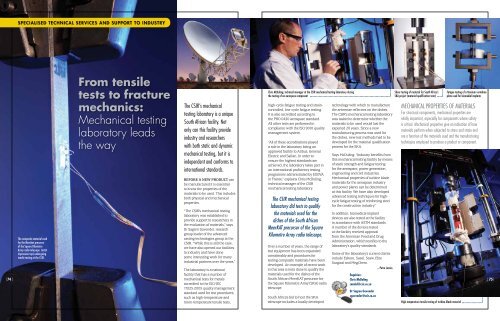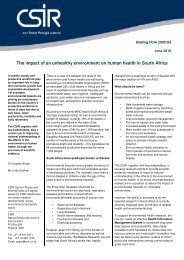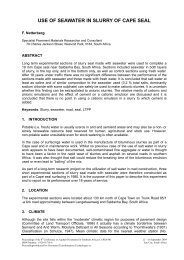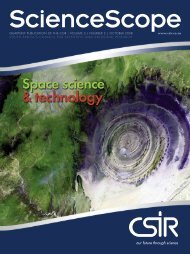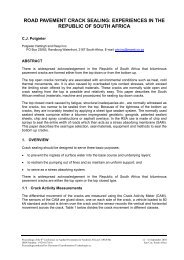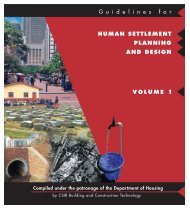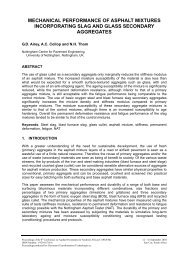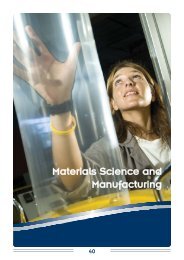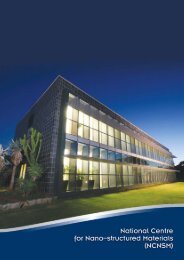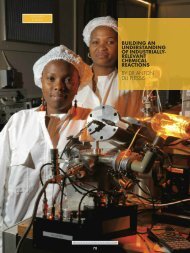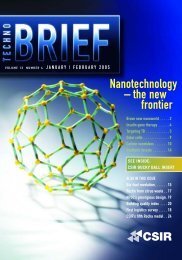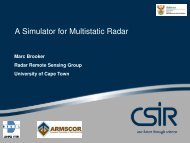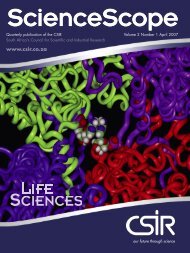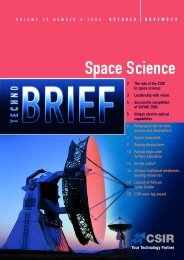Commercialisation successes <strong>and</strong> opportunities| 72 |From polymertechnologyto cosmetic productsA polymer gel that originated in the <strong>CSIR</strong>’s polymers<strong>and</strong> composites research laboratorieswas reinvented to become ahighly successful internationalcosmetic product.The product,called Eyeslices,is commercially available internationally.Eyeslices is an innovative, cryogel eye pad, which slowlyreleases active ingredients to the skin to combat a widerange of eye irritations. It reduces the appearance of redeyes, dark circles under eyes, tired eyes, wrinkles <strong>and</strong> puffyeyes within minutes of use.It started when <strong>CSIR</strong> researchers with expertise in polymersinvented a water-soluble polymer gel that functionedas a dermal delivery system – in other words, a gel-likesubstance that could be liquefied <strong>and</strong> solidified to absorb<strong>and</strong> emit ingredients to the skin.In 2000, entrepreneur Kerryne Neufeldt, licensed thistechnology from the <strong>CSIR</strong> <strong>and</strong> built up a company (i-SlicesInnovations (Pty) Ltd) around it. By the end of 2006, thecompany had stocked the product in over 100 salons <strong>and</strong>spas in South Africa. The product is now exported to severalcountries, including Mexico, Australia, the United ArabEmirates <strong>and</strong> the USA.The company has received numerous awards <strong>for</strong> thisinnovative product, including a Technology Top 100 awardin 2007 <strong>and</strong> a SABS Design Institute Award in 2004. In2011, the company won the Technology Top 100 award <strong>for</strong>sustainability.The product continues to capture market share, with directresponse television campaigns marketing the product (underdifferent br<strong>and</strong>s) set to start in the USA in the near future.– Petro LowiesEnquiries:Eyeslices website: www.eyeslices.comPolymers are materials made of repeating strings of molecularstructures. Although the term ‘polymer’ is sometimes taken to referto plastics, it actually encompasses a large class of compoundscomprising both natural <strong>and</strong> synthetic materials with a wide varietyof properties.Inter-polymer complexation is a process where two polymers withcomplementary functional groups join together to <strong>for</strong>m a new productthat has properties different from that of the original two polymers.An example is a material with stimuli responsiveness, that is,it responds to changes in its environment such as temperature or pH.Increased food <strong>and</strong> beverageshelf-life – A local hero inventedthrough polymer technologyHaving food orbeverages stayfresher <strong>and</strong> lastlonger on the shelfis one ideal thateveryone in thefood <strong>and</strong> beverageindustries shouldinvest in. The <strong>CSIR</strong>invented a way <strong>for</strong>this ideal to becomea reality, withproven success.During the normalcourse of the research processat the <strong>CSIR</strong>’s encapsulation <strong>and</strong>delivery research group, newpolymer systems with specialproperties are created. It was thespecial nature of these newlycreated polymer systems that ledresearcher Dr Philip Labuschagne<strong>and</strong> his team to discover new uses<strong>for</strong> it. What they found was a veryh<strong>and</strong>y new technology specificallygeared towards the food <strong>and</strong>beverages industries.Their invention, which is nowpatented, is an oxygen barriertechnology. It has the potential toconsiderably lengthen the shelflifeof food <strong>and</strong> beverages storedin plastic containers.Labuschagne explains howthe invention happened: “Weregularly use a process calledinter-polymer complexation inour drug delivery research. Theresult is a polymeric product withunique properties – one of whichis that the polymer has a highdensity (or a close-knit polymernetwork <strong>for</strong>med by hydrogenbonds). This property led usto investigate its effect on thepermeability of gasses.”Not letting oxygen throughHis group did several trialson various inter-polymercomplexation systems until asystem was found that reducesoxygen permeability by a factorof about 20 (<strong>for</strong> polyester-basedplastics) <strong>and</strong> by a factor of around150 (<strong>for</strong> polyolefin-based plastics).“The consequence is that youcan increase the shelf-life of anyoxygen-sensitive beverage inplastic containers by up to 150times,” he says.“Another advantage of thistechnology is that it is a polymersolution that can easily beapplied to a plastic surface, suchas a beverage container, using asimple dip-coating process. Thepolymers used are also suitable <strong>for</strong>pharmaceutical use, thus they arecompletely non-toxic,” he says.Beverages that are typicallysensitive to oxygen are beer orciders, juices <strong>and</strong> any tomatobasedproducts. Traditionallythese products are stored inglass containers to ensuresufficient shelf-life. However,with this barrier technology, newopportunities <strong>for</strong> plastic packagingare possible. Plastic packagingis desirable because it reducesthe enormous cost (<strong>and</strong> carbonemissions) resulting from thetransport of heavy materials, suchas glass.An external coatingLabuschagne continues: “Thecoating is applied on the outside ofthe container using a dip-coatingprocess. Because it has somedegree of moisture susceptibility,a second protective UV-curableovercoat is applied over the barriercoating. Both these layers haveachieved approval <strong>for</strong> use asexternal coating on food containersby the American Food <strong>and</strong> DrugAdministration.”Cost-wise, the barrier technologycompares favourably to otherbarrier technologies, but issuperior to them in certainaspects. For example, metaloxidecoatings are expensive <strong>and</strong>suffer from brittleness; oxygenscavenger technology has alimited life span; <strong>and</strong> multi-layertechnology is not only prone todelamination, but also difficult torecycle. “The containers can alsobe produced locally which can leadto considerable cost savings,” saysLabuschagne.With local inventions such asthis barrier technology, it is justa matter of time be<strong>for</strong>e we willbe able to buy fruit juices thatcan stay in the fridge <strong>for</strong> at leasta month. Or beer sold in plasticrecyclable bottles rather than glass.“The food processing sector is thecountry’s largest manufacturingsector in employment terms withsome 160 000 employees. SouthAfrica has a competitive advantagein a number of fruit <strong>and</strong> beveragesub-sectors which, if fullyexploited, could place it amongthe top 10 export producers inhigh-value agricultural products.I believe that the oxygen barriertechnology has the potential toimprove the competitivenessof this sector,” concludesLabuschagne.– Petro LowiesEnquiries:Dr Philip Labuschagneplabusch@csir.co.za| 73 |
SPECIALISED TECHNICAL SERVICES AND SUPPORT TO INDUSTRY| 74 |The composite material used<strong>for</strong> the Meerkat precursorof the Square KilometreArray radio telescope (artistimpression top) undergoingtensile testing at the <strong>CSIR</strong>.From tensiletests to fracturemechanics:Mechanical testinglaboratory leadsthe wayThe <strong>CSIR</strong>’s mechanicaltesting laboratory is a uniqueSouth African facility. Notonly can this facility provide<strong>industry</strong> <strong>and</strong> researcherswith both static <strong>and</strong> dynamicmechanical testing, but it isindependent <strong>and</strong> con<strong>for</strong>ms tointernational st<strong>and</strong>ards.Be<strong>for</strong>e a new product canbe manufactured it is essentialto know the properties of thematerials to be used. This includesboth physical <strong>and</strong> mechanicalproperties.“The <strong>CSIR</strong>’s mechanical testinglaboratory was established toprovide support to researchers inthe evaluation of materials,” saysDr Sagren Govender, researchgroup leader of the advancedcasting technologies group at the<strong>CSIR</strong>. “While this is still the case,we have also opened our facilitiesto <strong>industry</strong> <strong>and</strong> have donesome interesting work <strong>for</strong> manyindustrial partners over the years.”The laboratory is a nationalfacility that has a number ofmechanical tests <strong>for</strong> metalsaccredited to the ISO/IEC17025:2005 quality managementst<strong>and</strong>ard used <strong>for</strong> test procedures,such as high-temperature <strong>and</strong>room-temperature tensile tests,Chris McDuling, technical manager at the <strong>CSIR</strong> mechanical testing laboratory duringthe testing of an aerospace componenthigh-cycle fatigue testing <strong>and</strong> straincontrolled,low-cycle fatigue testing.It is also accredited according tothe PRO 0430 aerospace st<strong>and</strong>ard.All other tests are per<strong>for</strong>med incompliance with the ISO 9001 qualitymanagement system.“All of these accreditations playeda role in the laboratory being anapproved facility to Airbus, GeneralElectric <strong>and</strong> Safran. In order toensure the highest st<strong>and</strong>ards areachieved, the laboratory takes part inan international proficiency testingprogramme administrated by EXOVAin France,” explains Chris McDuling,technical manager of the <strong>CSIR</strong>mechanical testing laboratory.The <strong>CSIR</strong> mechanical testinglaboratory did tests to qualifythe materials used <strong>for</strong> thedishes of the South AfricanMeerKAT precursor of the SquareKilometre Array radio telescope.Over a number of years, the range oftest equipment has been exp<strong>and</strong>edconsiderably <strong>and</strong> procedures <strong>for</strong>testing composite materials have beendeveloped. An example of recent workin this area is tests done to qualify thematerials used <strong>for</strong> the dishes of theSouth African MeerKAT precursor <strong>for</strong>the Square Kilometre Array (SKA) radiotelescope.South Africa’s bid to host the SKAtelescope includes a locally developedtechnology with which to manufacturethe antennae reflectors on the dishes.The <strong>CSIR</strong>’s mechanical testing laboratorywas tasked to determine whether thematerials to be used would last theexpected 20 years. Since a newmanufacturing process was used <strong>for</strong>the dishes, new test methods had to bedeveloped <strong>for</strong> the material qualificationprocess <strong>for</strong> the SKA.Says McDuling: “Industry benefits fromthis mechanical testing facility by meansof static strength <strong>and</strong> fatigue testing<strong>for</strong> the aerospace, power generation,engineering <strong>and</strong> civil industries.Mechanical properties of turbine bladematerials <strong>for</strong> the aerospace <strong>industry</strong><strong>and</strong> power plants can be determinedat this facility. We have also developedadvanced testing techniques <strong>for</strong> highcyclefatigue testing of rein<strong>for</strong>cing steel<strong>for</strong> the construction <strong>industry</strong>.”In addition, biomedical implantdevices are also tested at the facilityin accordance with ASTM st<strong>and</strong>ards.A number of the devices testedat the facility received approvalfrom the American Food <strong>and</strong> DrugAdministration, which testifies to thelaboratory’s quality st<strong>and</strong>ards.Some of the laboratory’s current clientsinclude Eskom, Sasol, Scaw, EliteSurgical <strong>and</strong> MegChem.– Petro LowiesEnquiries:Chris McDulingcmcdul@csir.co.zaDr Sagren Govendersgovender@csir.co.zaShear testing of material <strong>for</strong> South Africa’sSKA project (material qualification tests)Fatigue testing of a titanium vertebraeplate used <strong>for</strong> biomedial implantsMECHANICAL PROPERTIES OF MATERIALSFor structural components, mechanical properties arevitally important, especially <strong>for</strong> components where safetyis critical. Mechanical properties give an indication of howmaterials per<strong>for</strong>m when subjected to stress <strong>and</strong> strain <strong>and</strong>are a function of the materials used <strong>and</strong> the manufacturingtechniques employed to produce a product or component.High-temperature tensile testing of turbine-blade material| 75 |


